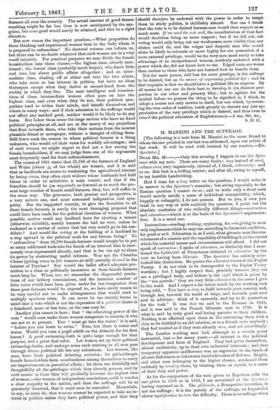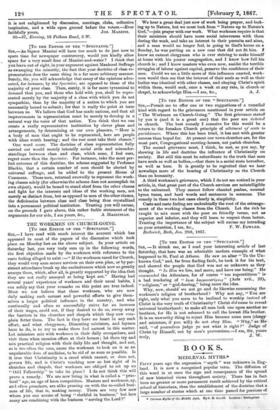M. MAZZINI AND THE SUFFRAGE.
[The following is a note from M Ma77jni to the same friend to whom the one printed in our last was addressed, upon our article of last week. It will be read with interest by our readers.—En. Spectator.] DEAR Mn. M—,—Only this evening I happen to see the Spec- tator with my note. There are many faults ; may instead of must, collator vires, very ingeniously, instead of, I think, collectivity; and so on. But that is a trifling matter; and after all, owing to myself, to my horrible handwriting.
Had I time for a long letter on the question, I would write it in answer to the Spectator's remarks; but owing especially to the Roman question I cannot do so;: and to write only a short note would merely satisfy a sense of individual susceptibility, which, happily or unhappily, I do not possess. BO to you, if ever you treat in any way or with anybody the question, I point out the absolute confusion of two radically different things—instruction and education—which is at the basis of the Spectator's argumenta- tion. It is a usual one.
Instruction—reading, writing, cyphering, &c.—is giving to man only implements which he may use, according to his moral condition, for good or evil. Education is, as I said, what gives to man the con- sciousness of a mission and the capabilityof fulfilling it, to the extent which his material means and circumstances will afford. I did not speak of instruction: I spoke of education, so distinctly that I men- tioned the 6,000,000 of Frenchmen initiated to education by the vote as having been illiterate. The Spectator has entirely over- looked this distinction. He quotes the educated voters of the Poplar Vestry. I do not wish to be disrespectful to the Poplar Vestry worthies ; but I highly suspect that, precisely because they too are a privileged body, and believe in the right which is given by the "ten pounds ;" they are very little educated in the sense I give to the word. And I expect a far better result by the working men being told, " You have a duty to fulfil towards your country and, through her, towards the world at large, and towards your own soul in addition : think of it earnestly, and try to fit yourselves for the task." It was that we said to the Romans in 1849, and it was said to the French illiterate men in 1789. It is what is said by truly good and loving parents to their children. Nothing is so effectual upon them as the entrusting them with a duty to be fulfilled to an old relation, or to a friend, or to anybody ; they feel treated as if they were already men, and act accordingly. The London working men had, although to a certain point instructed, lost — for many years — all interest in the political development and fates of England. They had given themselves, almost exclusively, up to their own industrial interests ; and that temporary apparent indifference was an argument in the hands of all anti-Reformers or lukewarm timid advocates of Reform. Bright, and other men belonging to the higher classes, awakened them suddenly by trusting them, by treating them as equals, to a sense of their duty and power.
As for the comparison of the vote given to Napoleon with the one given in 1789 or in 1849, I am astonished at the Spectator having ventured on it. The plibiscite, a Bonapartist invention, is not the suffrage ; it is the parody of the suffrage, an Imperialist clever mystification to turn the difficulty. There is no suffrage when it is not enlightened by discussion, meetings, clubs, collective inspiration, and a wide open ground before the voters.—Ever faithfully yours, Jos. MAzzusr. 30-67, Evening, 18 Fulham Road, S.W.



































 Previous page
Previous page